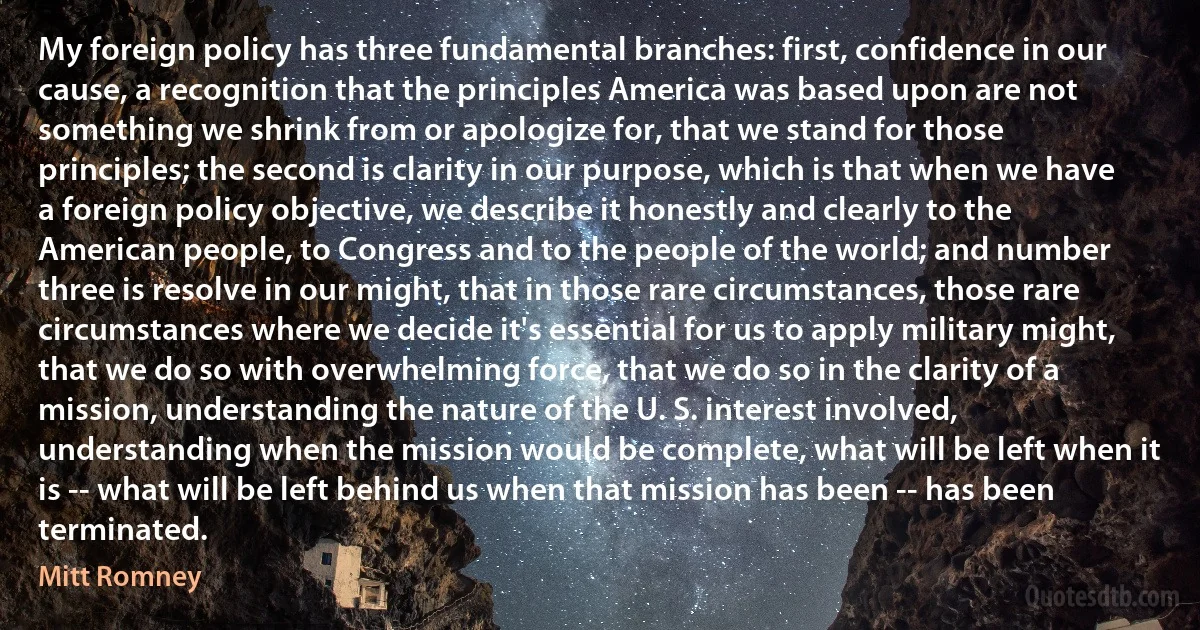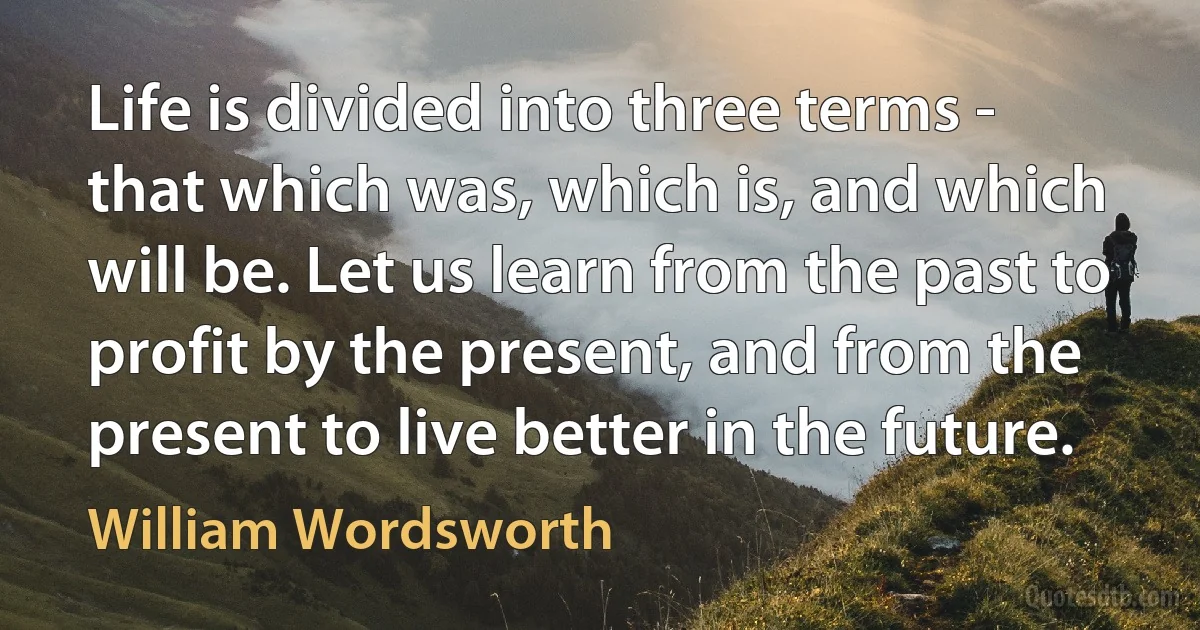Three Quotes - page 98
On Hillary Clinton's watch at the State Department, America's interests were diminished in every corner of the world. She compromised our national secrets, dissembled to the families of the slain, and jettisoned her most profound beliefs to gain presidential power. For the last three decades, the Clintons have lived at the intersection of money and politics, trading their political influence to enrich their personal finances. They embody the term ".” It disgusts the American people and causes them to lose faith in our political process.

Mitt Romney
Barack Obama has failed America. When he took office, the economy was in recession. He made it worse. And he made it last longer. Three years later, over 16 million Americans are out of work or have just quit looking. Millions more are underemployed. Three years later, unemployment is still above 8%, a figure he said his stimulus would keep from happening. Three years later, foreclosures are still at record levels. Three years later the prices of homes continue to fall. Three years later, our national debt has grown nearly as large as our entire economy. Families are buried under higher prices for food and higher prices for gasoline. It breaks my heart to see what's happening in this country. These failing hopes make up President Obama's own misery index. It's never been higher.

Mitt Romney
In Geneva lived Jean-Jacques Rousseau. He too was a rebel, mighty in war. Voltaire was keener, wittier, deeper, greater. Rousseau was more fiery, emotional, passionate. Both were really warriors in the same great cause. From their different places, three miles apart, both sent forth their thunderbolts to wake a sleeping world. When the world awakened and shook itself, churches, thrones, institutions, laws, and customs were buried in the wreck. Some charged the wreck to Voltaire, some to Rousseau.

Clarence Darrow
My grandfather said people who can learn, learn morality the way they learn everything else, by building on history. He also said that some people cannot learn from history, so they cannot change. For them, there's only one book or tradition or whatever it's called in their religion, and in that book God is eternal and whatever the book says God commanded two or three or four thousand years ago, God still commands today. That may be kill homosexuals or kill nonbelievers. It may say enslave your enemies. It may say mutilate or sequester women, or sell your ten-year-old daughter for somebody's third wife.

Sheri S. Tepper
...Witnesses in this case do have a habit of dying at the most inconvenient times. I understand a London insurance firm has prepared an actuarial chart on the likelihood of 20 of the people involved in this case dying within three years of the assassination -- and found the odds 30 trillion to one. But I'm sure NBC will shortly discover that one of my investigators bribed the computer.

Jim Garrison
We leave the question whether a man shall be a brain or hand worker entirely to him to settle. At the end of the term of three years as a common laborer, which every man must serve, it is for him to choose, in accordance to his natural tastes, whether he will fit himself for an art or profession, or be a farmer or mechanic. If he feels that he can do better work with his brains than his muscles, he finds every facility provided for testing the reality of his supposed bent, of cultivating it, and if fit of pursuing it as his avocation. The schools of technology, of medicine, of art, of music, of histrionics, and of higher liberal learning are always open to aspirants without condition.

Edward Bellamy
The Federal commissioners sat down across the mahogany table from their Southern hosts. After a couple of minutes of chitchat meant to be polite- but during which the three Confederates managed to avoid speaking directly to Butler- Seward said, "Gentlemen, shall we attempt to repair the unpleasantness that lies between our two governments?" "Had you acknowledged from the outset that this land contained to governments, sir, all the unpleasantness, as you call it, would have been avoided," Alexander Stephens pointed out. Like his body, his voice was light and thin. "That may be true, but it's moot now," Stanton said. "Let's deal with the situation as we have it, shall we? Otherwise useless recriminations will take up all our time and lead us nowhere. It was, if I may say so, useless recriminations on both sides that led to the breach between North and South."

Harry Turtledove
The best illustration I can give of his talent is that at Manchester United there was always a possession drill in training designed to develop our passing ability, which might be three players against another three players, or six versus six, or nine versus nine. But no matter what the numbers were, the side with Paul Scholes on their team would always win by keeping the most possession.

Paul Scholes
The classical legacies of political thought, from Plato to Nietzsche, and the immediate tasks of running the world, at home and abroad, have been of most concern to the Right. Normative philosophical constructions have become a specialty of the Centre. Economic, social and cultural investigations – of past and present – dominate the output of the Left. Any attempt to come to grips with all three outlooks is thus obliged to traverse quite variegated ground.

Perry Anderson
There as elsewhere a cruel universe combined to crush a child. As though three or four vigorous brothers and sisters, with the best will, were not enough to crush any child, every one else conspired towards an education which he hated. From cradle to grave this problem of running order through chaos, direction through space, discipline through freedom, unity through multiplicity, has always been, and must always be, the task of education, as it is the moral of religion, philosophy, science, art, politics, and economy; but a boy's will is his life, and he dies when it is broken, as the colt dies in harness, taking a new nature in becoming tame. Rarely has the boy felt kindly towards his tamers. Between him and his master has always been war. Henry Adams never knew a boy of his generation to like a master, and the task of remaining on friendly terms with one's own family, in such a relation, was never easy.

Henry Adams
Mary's treatment of respectable and law-abiding people who had no favors to ask, and were reasonably confident of getting to heaven by the regular judgment, without expense, rankled so deeply that three hundred years later the puritan reformers were not satisfied with abolishing her, but sought to abolish the woman altogether as the cause of all evil in heaven and on earth. The puritans abandoned the New Testament in order to go back to the beginning, and renew the quarrel with Eve. This is the Church's affair, not ours, and the women are competent to settle it with Church or State, without help from outside; but honest tourists are seriously interested in putting the feeling back into the dead architecture where it belongs.

Henry Adams



